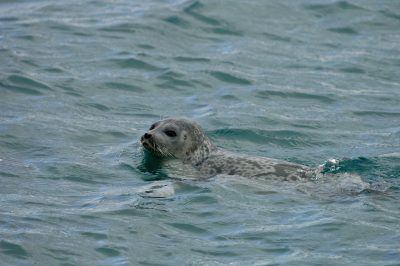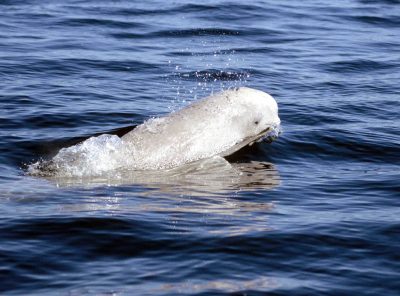
Canadian ringed seal (©Marie Auger-Méthé.)
It found that transformations to the makeup and distribution of fish species—as well as the size of fish in Hudson Bay—will begin to accelerate by 2025, and become progressively more extreme unless action is taken to reduce carbon emissions.
Using computer models, the researchers examined how these changes to prey would affect ringed seals, a common Arctic marine predator.
“We found that by the end of the century, the large, fatty Arctic cod may decline dramatically in terms of biomass and distribution. Then smaller fish, like capelin and sand lance, may become much more prevalent,” said Katie Florko, a UBC PhD student at the Institute for the Oceans and Fisheries (IOF) and the lead author of the study. “The number of fish and the biomass will increase, as will the diversity of the fish, but they’ll come in smaller packages.”
This shrinking diet may leave ringed seals — and potentially other Arctic marine predators — with less energy gained during foraging.
“It costs energy to forage. Does that mean the seals will need to spend more energy to get a larger number of these smaller fish for the same amount of energy as capturing a bigger fish?” Florko said. “It’s not unlike how the burgers in fast food restaurants seem to get smaller and smaller every year, and you’re getting less bang for your buck.”
As Arctic waters heat up, the Arctic cod that live under the sea ice will move northwards or become less abundant. Less heat-sensitive species, such as capelin and sand lance, will become more prevalent in the southern region of Hudson Bay and expand their territory by moving farther north. As well, if the atmosphere continues to be polluted with greenhouse gases, all varieties of fish that the study analyzed will shrink in size—about 18-35 per cent for Arctic cod and 45-82 per cent for Pacific sand lance.

Beluga in the mouth of the Churchill River in the Hudson Bay, Canada. ©Ansgar Walk, CC BY-SA 2.5
Also, people who rely on eating seals as part of their diet may consume fewer contaminants since the smaller fish predicted to become staples of seal diets are lower down the food web and do not accumulate as many contaminants.
Despite these potential benefits, the low-emission scenario is still ideal, according to the study’s authors.
“We’ve never seen such drastic change so quickly,” said Travis Tai, a graduate of the IOF’s PhD program and co-author of the study.
“We’re rolling the dice, and we don’t know what exactly will happen. When we have dramatic shifts in food web structures, we can expect large changes not only to how species such as ringed seals use the oceans, but also how people use the oceans.”
The study “Predicting how climate change threatens the prey base of Arctic marine predators” was published in the journal Ecology Letters.
Tags: animal movement, Arctic, fish stocks, IOF students, Research, seals, SERG